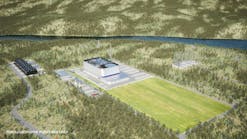Rensselaer Polytechnic Hosting NuScale Power Training Center to Research & Promote SMR Nuclear Technologies
Small modular reactor designer NuScale Power is the latest next-gen nuclear startup to partner with research universities as they try to make SMRs a reality in the coming decades.
NuScale Power has opened a new Energy Exploration (E2) Center at Rensselaer Polytechnic Institute in Troy, New York. RPI is the oldest polytechnic university in the English-speaking World, according to the partners.
The E2 training center will provide students from RPI’s School of Engineering with the opportunity to get an understanding of advanced nuclear technology and its promising role in the global energy transition. It will also provide information on the features and functionality unique to NuScale’s particular SMR technology.
NuScale has been one of the leaders among SMR startups in gaining design approval by the U.S. Nuclear Regulatory Commission (NRC). The Oregon-based company’s design of a 50-MW SMR version gained NRC approvals and $600 million in funding from power plant engineering and construction giant Fluor Corp., but its planned commercial test project at the Idaho National Laboratory, the Carbon Free Power Project, was cancelled due to a lack of subscriptions to help fund it.
In the meantime, however, a number of major tech customers have announced plans to explore partnerships with SMR firms. Nuclear energy, which generates carbon-free electricity, already accounts for 18% of U.S. power generation resources.
The E2 Center at RPI will utilize computer modelling within a 12-module control room simulator. This will allow users at RPI to assume the role of control room operator, providing the chance to apply nuclear science and engineering principles and achieve real-life experience.
“Having a high-quality simulator on campus will provide our students with exciting learning opportunities in the design, operation, and control of modern, small modular reactors,” said Shekhar Garde, Ph.D., dean of the RPI School of Engineering, in a statement. “This capability adds to the growing strength of RPI’s School of Engineering in augmented, virtual, and digital technologies for education, where students can learn about everything from atoms to galaxies, and work on designing new drugs, airplanes, and, now, nuclear reactors.”
The potential of SMR nuclear power—seen as smaller, safer and less expensive that massive conventional reactor plants such as Vogtle 3 and 4 in Georgia—has attracted both investment from the data center technology sector as well as university research. Texas A&M has created a site at its Bryan, Texas campus to four companies—Kairos Power, Natura Resources, Terrestrial Energy and Aalo Atomics—where they can build and research SMR prototypes.
Natura Resources also is working with the private Abilene Christian University on work to construct and learn about a 1-MW molten salt test reactor.
NuScale itself has introduced eight E2 Centers with university partners, including RPI, Oregon State University (Corvallis, OR), Texas A&M University (College Station, TX), Idaho State University (Pocatello, Idaho), University Politechnica (Bucharest, Romania), Seoul National University (Seoul, South Korea), The Ohio State University (Columbus, Ohio), and Ghana Atomic Energy Commission (Accra,Ghana).
Some energy experts forecast that GWs of SMR and other nuclear power plants will need to be built or expanded to meet not only future data center and electrification demands, but also sustainability and emissions reductions goals. Detractors say that SMRs would still be too expensive and time-consuming, while also struggling to get community approval or local permitting for construction and commissioning.






